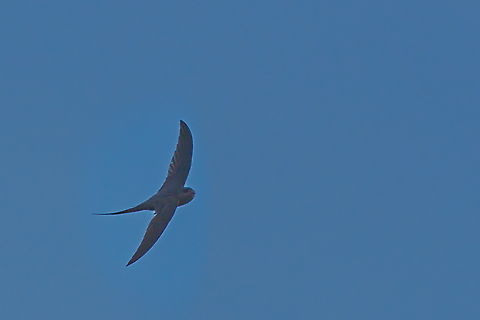
Appearance
This 16 cm long species is mainly pale brown in colour. It has long swept-back wings that resemble a crescent or a boomerang. The body is slender, and the tail is long and deeply forked, although it is usually held closed. The call is a loud, shrill scream. Sexes are similar, and young birds differ mainly in their shorter tails. Palm swifts have very short legs which they use only for clinging to vertical surfaces, since swifts never settle voluntarily on the ground.Distribution
The African palm swift is native to Angola, Benin, Botswana, Burkina Faso, Burundi, Cameroon, Central African Republic, Chad, Congo, Democratic Republic of the Congo, Equatorial Guinea, Eritrea, Eswatini, Ethiopia, Gabon, Gambia, Ghana, Guinea, Guinea-Bissau, Ivory Coast, Kenya, Liberia, Malawi, Mali, Mauritania, Mayotte, Mozambique, Namibia, Niger, Nigeria, Rwanda, São Tomé and Príncipe, Saudi Arabia, Senegal, Sierra Leone, Somalia, South Africa, South Sudan, Sudan, Tanzania, Togo, Uganda, Yemen, Zambia and Zimbabwe.Habitat
These swifts spend most of their lives in the air, living on the insects they catch in their beaks. Palm swifts often feed near the ground. They drink on the wing. It is a common resident breeder in tropical Africa. The down and feather nest is glued to the underside of a palm leaf with saliva, which is also used to secure the usually two eggs. This is a fast flying bird of open country, which is strongly associated with oil palms but is also found in wooded savannah, thornbush and cultivated land.References:
Some text fragments are auto parsed from Wikipedia.